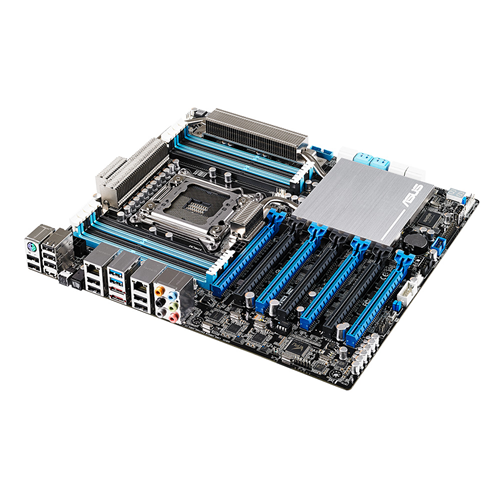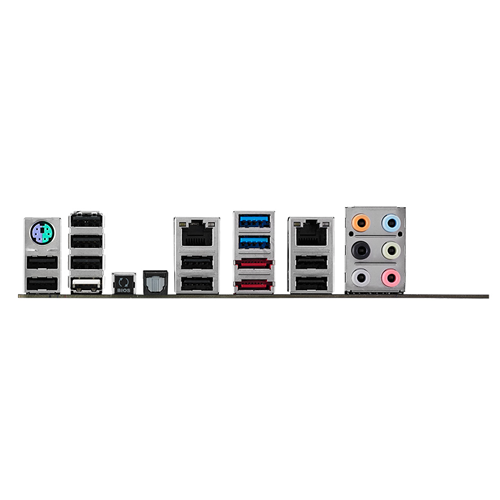Asus Rolls Out P9X79-E WS LGA2011 Motherboard
Asus has released its X79-based P9X79-E WS Motherboard.
Asus has launched its new P9X79-E WS motherboard. This motherboard features the LGA2011 socket and has support for both Ivy Bridge-E CPUs and Xeon Ivy Bridge-EP CPUs. The motherboard features the X79 chipset. This motherboard has a very broad and complete feature set.
The motherboard has support for up to 64 GB of DDR3-2133 ECC memory split through eight memory slots. This allows for quad-channel memory support. Beyond that, the motherboard has a total of seven PCIe x16 slots, allowing for four-way SLI or CrossFireX. The CPU is fed its power through a 10-phase VRM design, which is fueled by a single 8-pin EPS connector. The memory has its own 2+2 VRM power circuitry. The motherboard also has plenty of storage connectivity; it features six SATA3 ports and four SATA2 ports, as well as another two eSATA3 ports.
External connectivity is taken care of by a legacy PS/2 connector, two eSATA ports, two Gigabit Ethernet ports, two USB 3.0 ports, 10 USB 2.0 ports, a USB BIOS flashback button, 7.1 channel HD audio, as well as an optical TOSLINK port. Internally, the motherboard also has two USB 3.0 ports through a header.
The Asus P9X79-E WS motherboard is already available at select retailers for an MSRP price of $499.99.
Get Tom's Hardware's best news and in-depth reviews, straight to your inbox.
Niels Broekhuijsen is a Contributing Writer for Tom's Hardware US. He reviews cases, water cooling and pc builds.
-
shadowfamicom Impressive offering. Gonna stick with my MSI Big Bang II though... when they start making more 16gb DDR3 sticks gonna fill it up with 8 of them and make a crazy RAMdisk.Reply -
ssdpro X79 really does feel like "2011" these days with 2 native SATA 6Gb/s ports and no native USB 3.0. PCIe 3.0 that "might work"? Crippled chipset? NEXT!Reply -
mapesdhs I currently have the normal WS. This new model looks like ASUS' responseReply
to the Asrock X79 Extreme11, except without adding SAS. It's nice that the
E improves the multi-GPU support to be 4-way @ x16 each, not so much for
gaming but for those using CUDA, etc., but a real shame that the 3rd party
6Gbit ports are still by Marvell because their controller is awful. 2 native Intel
ports just isn't enough. Does anyone make a decent SATA3 controller besides
Intel??
The only thing that annoys me with these boards is the locking mechanism
for the PCIe slots. With multiple cards installed and a big air cooler, it's kinda
hard to reach the latch to extract a card.
Performance-wise though, they're very good.
Ian.
-
purrcatian @mapesdhsReply
As far as I know, the only thing that comes close are LSI SAS controllers. But even then, they are not as good for most applications. -
mapesdhs I have lots of SAS controllers. It depends what you're doing. SAS cards giveReply
excellent sequential I/O, but 4K random is limited by the card's ASIC, which
can ruin the potential of multiple SSDs connected to such cards. They make
more sense when used with Enterprise SAS/SATA for strong sequential, but
with battery-backed cache to give strong 4K performance aswell (I get 2GB/sec
on one of my PCIe cards) combined with data reliability in the event of power
failure. But yes, multiple SSDs in RAID would work better with a bunch of native
Intel SATA3 ports if only such were available (alas most boards only have two).
Where you are wrong however is if one is just using a normal single mechanical
drive. A SAS card with a 600GB 15K SAS leaves any SATA in the dust when it
comes to general performance, while even just 3 of them will give more than
700MB/sec sequential.
The caveat though is that some SAS cards with 6bit SAS support will link at
only 3Gbit when connected to a SATA3 device. In the case of LSI, one can
user particular firmware releases to solve this issue for specific cards.
Ian.


